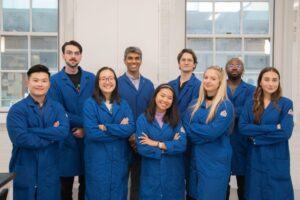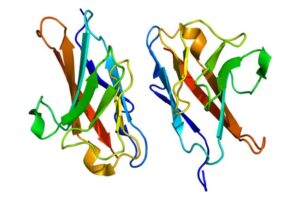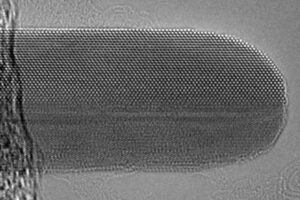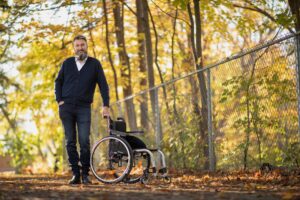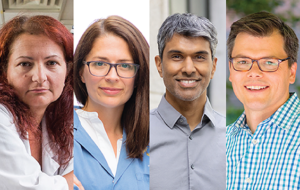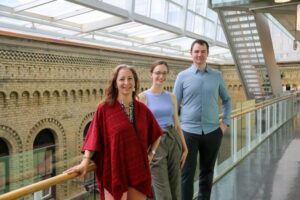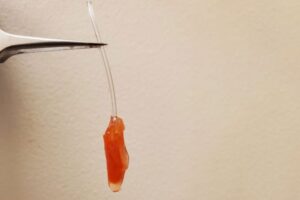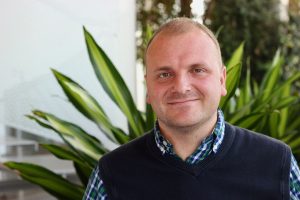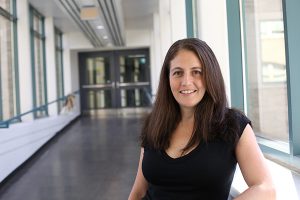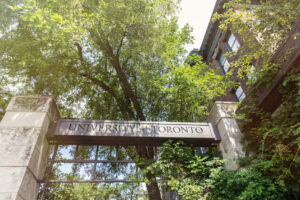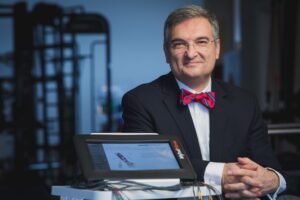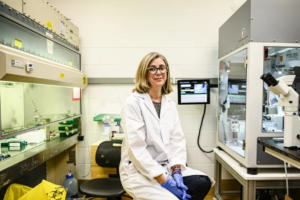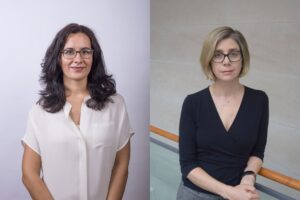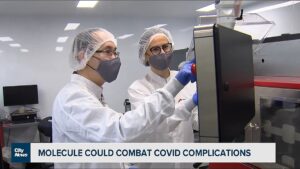Research News and Stories
Explore the latest news, stories, and groundbreaking research happening at the Institute of Biomedical Engineering. Stay updated on innovative projects, impactful discoveries, and the achievements of our talented students, faculty, and alumni shaping the future of biomedical science and engineering.
Quick Navigation
U of T Engineering lab partners with Moderna to develop RNA-based tools to treat and prevent disease
A team of U of T Engineering researchers, led by Professor Omar F. Khan (BME), has partnered with biotechnology company Moderna to develop next-generation RNA platform technologies.
Seeing smaller than light: How an advanced microscopy technique can help in the fight against cancer and other diseases
Microscopes are some of the most powerful tools in cell biology — but what if the cell component that needs to be imaged is smaller than the wavelengths of visible light? A new study from Professor Chris Yip (ChemE, BME) proposes a solution, one that could help advance research into cancer and other diseases.
New insight into how nanoparticles form could advance technologies from solar cells to medical tests
A research team from U of T Engineering has discovered previously unknown phenomena in the growth of nanoparticles. The insights could open new ways of engineering these tiny structures for a variety of purposes, from designing next-generation solar cells to developing new medical tests and treatments.
New CRAFT Tissue Foundry provides infrastructure dedicated to bioengineering innovation
The Centre for Research and Applications in Fluidic Technologies (CRAFT) has opened a new and expanded Tissue Foundry at the University of Toronto. The new facility builds CRAFT’s fabrication capacity following the launch of its Device Foundry in 2021.
Milica Radisic joins Donnelly Centre
The Donnelly Centre is swelling its ranks of leading researchers with two new faculty appointments.
Recipients of third round of Medicine by Design’s Pivotal Experiment Fund announced
Dr. Omar Khan is one of four researchers are the latest to receive support to spin-off aspects of their Medicine by Design-funded research into an early-stage product or venture as part of Medicine by Design’s Pivotal Experiment Fund, which has distributed more than $2.5-million in funding since its launch in early 2021.
New strategy for delivery of therapeutic proteins could help treat degenerative eye diseases
A U of T Engineering research team has created a new platform that delivers multiple therapeutic proteins to the body, each at its own independently controlled rate. The innovation could help treat degenerative diseases such as age-related macular degeneration (AMD), the leading cause of vision loss for people over 50.
U of T Engineering team designs new hydrogel that opens pathways to more targeted cancer treatments
A team of U of T Engineering researchers, led by Professor Molly Shoichet (ChemE, BME, Donnelly), has designed a new way to grow cells in a laboratory that enables them to better emulate cancerous tumours.
Reverse engineering the heart: U of T Engineering team creates bioartificial left ventricle
U of T Engineering researchers have grown a small-scale model of a human left heart ventricle in the lab. The bioartificial tissue construct is made with living heart cells and beats strongly enough to pump fluid inside a bioreactor.
Four CRANIA scientists receive funding for projects through UofT’s joint EMHSeed program
Dr. Jose Zariffa and Kei Masani are two of the recipients of EMHSeed, valued at $60,000/year for two years.
Dr. Alison McGuigan inducted as a fellow into the Canadian Academy of Engineering
Dr. Alison McGuigan inducted as a fellow into the Canadian Academy of Engineering.
Dr. Craig Simmons inducted as a fellow into the Canadian Academy of Engineering
Dr. Craig Simmons’ distinguished contribution in engineering has earned him a place as a fellow in the Canadian Academy of Engineering.
U of T researchers awarded 20 new and renewed Canada Research Chairs
Dr. Rodrigo Fernandez-Gonzalez was one of the BME faculty members awarded the Canadian Research Chair this year.
Megh Rathod receives trainee award from Transform HF
Megh Rathod is a graduate trainee in Biomedical Engineering (Clinical Engineering stream) at the University of Toronto.
People of Medicine by Design: Omar F. Khan
Omar F. Khan was first inspired to be an engineer by his father’s workplace accident. Now, his lab is studying nanomaterials & pushing the boundaries of regenerative medicine.
MyndTec brings one of KITE’s scientific breakthroughs to market
Dr. Popovic co-founded MyndTec in 2008, and by 2015, MyndMove therapy was available to patients.
Heart, cancer and diabetes projects among winners of funding boost for stem cell therapies
Dr. Vasconcelos is one step closer to achieving that goal with a $3-million grant from the Stem Cell Network, a Canadian research funding organization. Her effort is one of 32 projects across the country that rose to the top in a competition for in the largest outlay of federal funding for regenerative medicine in 20 years.
Trailblazing Stem Cell Research
Professor Milica Radisic and Sara Vasconcelos are two faculty who received Stem Cell Network funding for stem cell research.
U of T research team developing new treatment for COVID-19 complication
A University of Toronto research team, led by Milica Radisic, says they have identified a treatment that could help combat one of the most serious COVID-19 complications.
